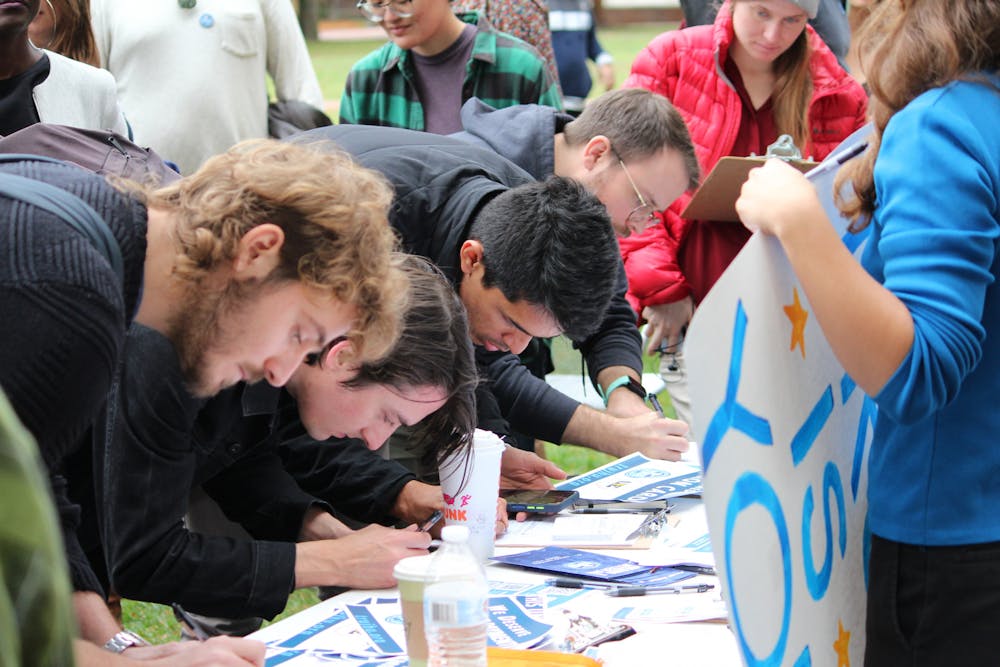Hopkins has a worldwide reputation as a center for public health information that serves to protect people around the world. Despite this, the institution has continued to exploit its workforce, including the graduate student workers whose work generates billions of dollars in funding from grants, private donations and government contracts.
Because of this, graduate workers launched a union card campaign with Teachers and Researchers United and United Electrical, Radio, and Machine Workers (TRU-UE) on Oct. 25. With a supermajority of graduate student workers having signed on union cards since, the card campaign demonstrates wide support for a democratic collective bargaining process to determine the working conditions of Hopkins graduate student workers.
Just two weeks after this launch, by which point a majority of graduate students had signed their union cards, the Krieger School of Arts and Sciences (KSAS) announced a long-overdue increase in its base stipend. Graduate workers can already see that their campaign is working and that Hopkins knows that they are not going to accept this treatment anymore.
Yet the new KSAS minimum — $34,500 — remains well below the cost of living in Baltimore — $40,000 when accounting for inflation — and represents a one-time improvement to only some of the systemic underpayment of all graduate workers on campus.
The negligible increase in stipends in KSAS is, of course, an attempt to follow an anti-union playbook that has been adopted by universities across the country. We have seen a clear link between union organization and graduate worker wage increases at similar R1 universities: In 2021, within three weeks of their card campaign announcement, all Massachusetts Institute of Technology graduate student workers received a 3% raise in stipends. Just this year, Duke University announced an 11.4% increase and Dartmouth University announced a 14.3% increase in stipend floor for graduate student workers on the heels of exciting campaign launches.
This is not a recent strategy — looking further back, we see universities acting quickly to provide benefits that graduate students have been demanding for years in response to their unions gaining traction. Notably, Hopkins responded to our union campaign by providing all graduate workers with dental and vision coverage in 2018.
While Hopkins has made an attempt to stifle the union movement, an insultingly small increase that does not meet the cost of living does not significantly improve the lives of graduate workers and will certainly not convince us to give up the demands that only a union contract can ensure.
The long-overdue raises have not even improved wages for workers across the entire University. Despite the University’s eminence as a public health leader throughout the COVID-19 pandemic, students in the Bloomberg School of Public Health (BSPH) have yet to see any announcements of stipend raises. The current stipend for most students in the BSPH sits at a approximately measly $26,000 — and that’s for students who receive a stipend to begin with.
In the School of Nursing, PhD candidates are only guaranteed a stipend for part of their degree program, after which they will have to either secure external funding or start paying tuition and insurance themselves to continue working for the University.
We know that without a union, the University will continue to exploit students’ “world-class” contributions to public health, which have continually earned Hopkins the top-ranking spot among public health schools and impressively high ranks among hospitals, for wholly unlivable wages.
The three of us are coming together with thousands of our coworkers because we see the way Hopkins is attempting to divide us up by maintaining inequities between departments, making it impossible for any of us to make necessary change alone. By standing side by side with every Hopkins grad student — regardless of discipline, school or research topic — we are building a union that can bargain as a single collective and fight for all of us.
This divide-and-conquer strategy is yet another reason why TRU-UE’s campaign is sorely needed to present a united front of all graduate workers across the schools at Hopkins who demand a living wage for all, effective grievance procedures, guaranteed on-time payment, improved support for international students, safe and reliable facilities and transport and a commitment to Baltimore City. A union is the only way we all win.
Andrew S. Eneim is a fourth-year PhD candidate in the School of Medicine. Jayati Sharma is a second-year PhD student at the Johns Hopkins Bloomberg School of Public Health. Frank Liu is a third-year PhD student at the Johns Hopkins Krieger School of Arts and Sciences. All three are members of the Teachers and Researchers United Organizing Committee.





